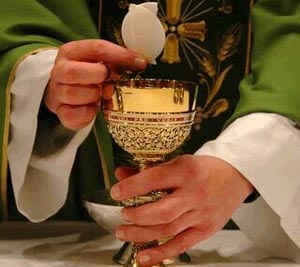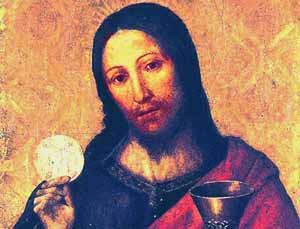 |
Special Devotions
Comments on a Meditation of St. Ignatius - II
Our Debt of Gratitude to the Holy Eucharist
Plinio Corrêa de Oliveira
Since the gift of the Eucharist is so splendid, as we saw in the last article, we should use it as Our Lord desired, that is, for all the needs we have in our spiritual life. This corresponds to the third point of St. Ignatius meditation: the utility of the gift.

At Communion we should ask for all that we need |
Let us imagine that a young man has the vice of envy. He could make the following reflection: “I am going to receive the One who is supreme generosity and goodness, the One who never envied anyone but, on the contrary, is happy for all the good that He does for others. My Lord, come to me and give me Your goodness, cleanse me of the defect of envy that I see in myself.”
Thus he prepares himself for Communion, recollecting himself and meditating on this point before receiving Our Lord.
Another person needs help to be pure. Our Lord Jesus Christ is purity itself. His Blood is called “the wine that generates virgins.” We know that no one can maintain purity without a grace that comes from Him.
So, this young man could ask Him: “My Lord, give me purity. Come to my soul to communicate Your purity. Through Mary Most Holy, I beseech You, make me pure, give me a purity like the purity of the Virgin Mary, who best mirrors Your purity.”
We may ask for everything that we need. He is in the Eucharist to help us with all our necessities. We should ask without timidity or fear.
To make such a request is a consequence of the last point St Ignatius makes. The thoughts he offers on the Eucharist are so profound that before Communion, it suffices to take one of his points and concentrate seriously on it for a Communion to be well made.
When preparing for Communion, it would be good to have his entire meditation at hand to read. Then, we could choose one point to ponder.
Gratitude becomes obligatory
St. Ignatius Loyola continues his meditation addressing the reader with this consideration:
“How enormous your avarice toward God will be if, considering the immense liberality He had for you in the Eucharist, you do not offer what remains of the liberty you still did not give Him? Until now you have resisted His other gifts, but how can you resist a God who gives Himself to you?”

In the Eucharist Our Lord gives us everything He owns |
This is an admirable question. Imagine that a person of importance would come to your home and say, “Look, John, I came here and I want to be your friend. I want to give myself completely to you with everything I have.”
Thus, he is giving you everything he owns: his fortune, properties, automobiles, airplanes, everything in his bank account – all this he is giving you at that moment. What should be your normal response? You would take some fine object in your home and offer it to him, saying, “I know that this is completely out of proportion to your gift, but to show you that I am grateful, please take this.”
It is the minimum you could do. Or else you might pour him an excellent liqueur and say, “I know that this is inadequate, but I ask you to accept this drink. It is a meager expression of what I would like to do for you.” The most elementary gratitude calls for this.
Then St. Ignatius places before us one of those supremely logical questions – one that takes our soul almost like an elevator and raises it to a higher level where we find the road of virtue. He asks, “You are receiving this gift. What are you going to do? You have resisted other graces. Will you resist this grace also? God gives Himself to you. Will you not give yourself to Him? What pretext can you find for not offering yourself to Him completely in this Communion? He gives so much more and asks so little! How can you refuse to show your gratitude?”

The Count of Poitier (11th c.) in grateful recollection before Our Lord and Our Lady |
The normal corollary of a Communion is, therefore, an offering such as this: “My Lord, I am not worthy to receive You; nonetheless, You enter my soul. You give me the grace to desire to give myself to You. Give me the grace that one day – as soon as possible – I will be able to give myself to You entirely. That is, that I should abandon sin, cease to offend You, practice virtue in all things, and be a perfect soldier of your cause. Through Mary Most Holy, I beg this of You.”
Given the enormity of the gift, this becomes an obligatory retribution: One who receives so much should pay at least something for what he received. And if God gives Himself entirely to us, it would be absurd if we did not give ourselves entirely to Him
These reflections touch the deepest parts of a soul. If a person takes them seriously, he will be persuaded of what they say. For, in final analysis, if we believe that the Holy Eucharist is the Body and Blood of Christ, which we are receiving, how can we deny the validity of this reasoning? It could not be more persuasive.
How good is to have this thought of St. Ignatius and keep it with us during the day to remember once in a while! We might read it again and consider: “Today Our Lord gave Himself to me. In retribution, I am asking Him the grace to deliver myself entirely to Him. Hence, I make this or that sacrifice, I offer something that is hard for me to give up, etc."
Ask for everything, both great things and trifles
Or we might consider a different situation: “I know that today I will have before me a great trial, something very difficult. But if God gave Himself to me in the Eucharist today and is going to give Himself to me tomorrow, I must confide in Him. Do I not have sufficient reason to confide, seeing how much He gave to me? If I am asking just for a little more, will He not give that also? How can I not confide that He will help in this need or smile on me in that opportunity? It is not possible to doubt His assistance. I am going to live this day with confidence because God Our Lord will help me.”

Bullfighters praying before the Blessed Sacrament to ask for victory in their fights |
These are normal attitudes taken by a person who does not lose sight of the Communion that he received that day and the one he will receive tomorrow. This is how we prepare ourselves to become truly Eucharistic souls.
You see that this kind of meditation requires much seriousness. Today, unfortunately, it is not common to hear such things. But remember, this is from St. Ignatius of Loyola. It is an extraordinary teaching, approved by many Popes on many occasions.
Now imagine a man who lives in a country where there is a King. The King gives this person a principality. Later on, that man needs some small favor from the King, for example, that the King should command someone to give him a vaccination certificate. Should he be afraid to ask the King for this small thing? Of course not, since he gave him a principality, certainly he will give him this much smaller thing.
One should have a great largesse of soul and not fear to ask for much. He should think to himself, “Once He gave me so much, will He not give me something much smaller?” One should, therefore, make great requests, abundant requests. This is how we prepare to live our lives in function of Our Lord Jesus Christ in the Eucharist.
An invitation to seriousness
All this is profoundly serious, it is true, but these talks are an invitation to seriousness. Do you know why? Because if we are not serious in this life, when we will die we will have the greatest shock imaginable. For then we will be face to face with the infinite seriousness of God.
Then He will say to us, “I visited you daily for so many years. Every day I gave you the grace of desiring My visit. Every day you corresponded to that grace of going to Communion. But you were never serious when you received me in that visit I made to you. You received me without reflecting upon what it meant, not taking the consequences of that visit."
And how will we respond? We will hang our head and await the punishment that can well be, at the least, a long purgatory for having received Our Lord with such carelessness. You can understand, then, how worthwhile it is to meditate on this.
It would be good for us to have these points at hand at the time of our Communions. For the Eucharist must be the sap of our spiritual life.
Continued

Taken from the personal records of Atila S. Guimarães,
Summarized and translated for TIA’s site
Posted July 20, 2011

Related Topics of Interest
 The Magnitude of the Gift of the Holy Eucharist The Magnitude of the Gift of the Holy Eucharist
 How to Dress in the Presence of the Blessed Sacrament How to Dress in the Presence of the Blessed Sacrament
 The Eucharistic Miracle of Avignon The Eucharistic Miracle of Avignon
 How a Mule ‘Adored’ the Blessed Sacrament How a Mule ‘Adored’ the Blessed Sacrament
 The King and the Blessed Sacrament The King and the Blessed Sacrament
 The Baker’s Dog of Lisbon The Baker’s Dog of Lisbon
 Serving the King of Kings First Serving the King of Kings First

Related Works of Interest
|
|
Special Devotions | Religious | Home | Books | CDs | Search | Contact Us | Donate

© 2002- Tradition in Action, Inc. All Rights Reserved
|
 |
|